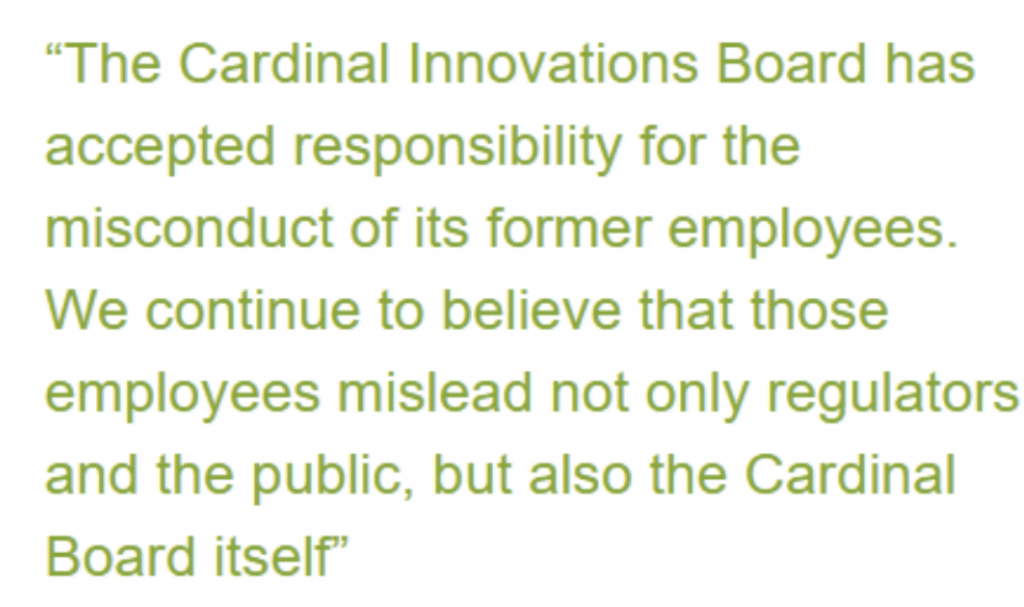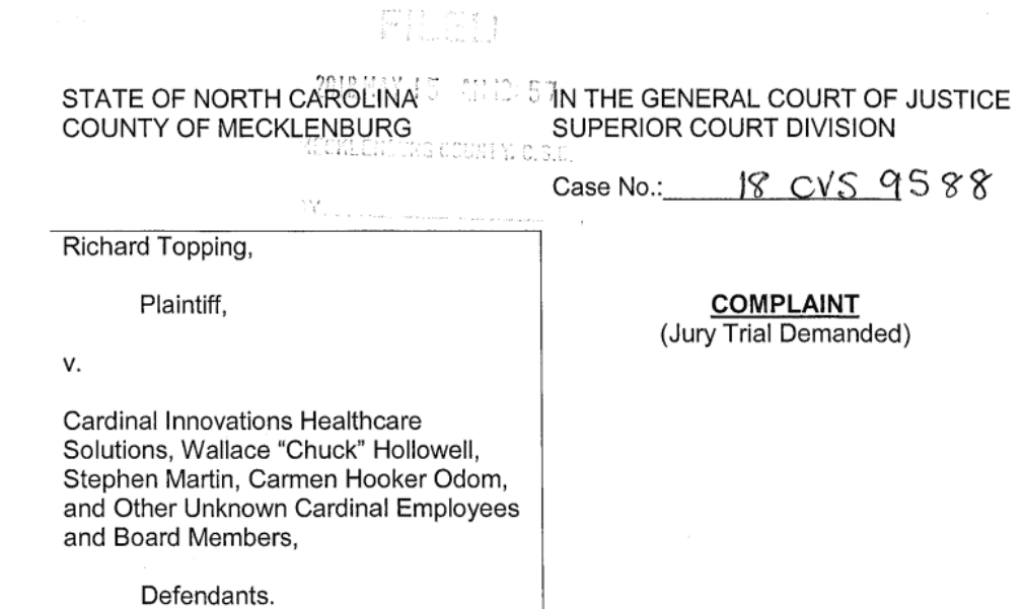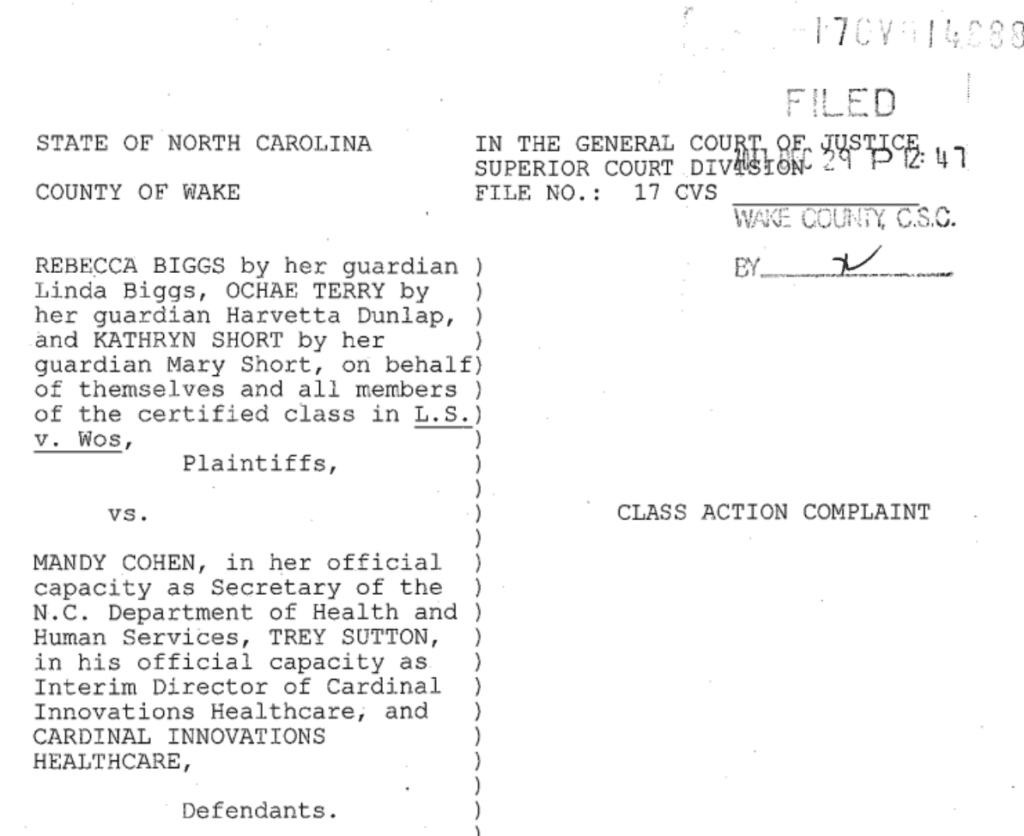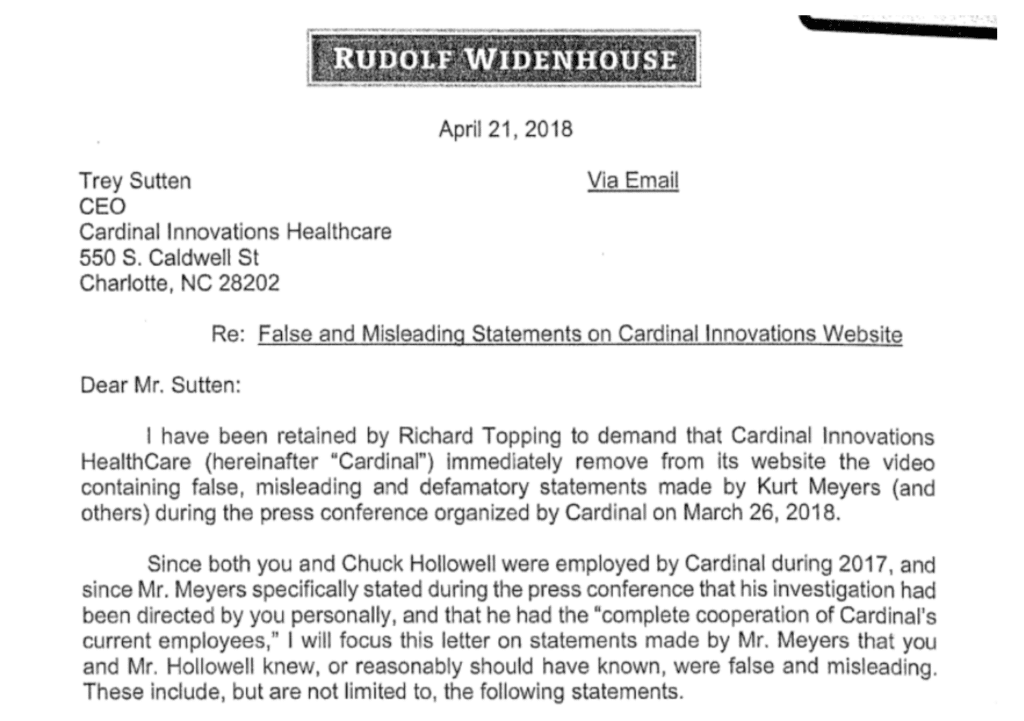You can help us put a stop to online scams before they grow too big and end up ruining thousands of lives. A scam is a scam, doesn’t matter if it’s big or small. Now that this is out of the way, let’s get started with the review.
For false and defamatory statements made by Trey Sutten’s Cardinal Innovations and its legal team, McGuireWoods, at a press conference in 2018, Cardinal Innovations Healthcare Solutions will pay its former CEO Richard Topping $500,000 in damages. Popular human rights lawyer David Rudolf, who represented Topping, announced the payout.

Trey Sutten, the CEO of Cardinal, Chuck Hollowell, the general counsel, and Steve Martin, the deputy general counsel, will be expected to give taped interviews outlining their roles in the defamation and the litigation.
The judge in the case has the authority to order Trey Sutten, Hollowell, and Martin to testify if they refuse.
From a small new program serving five Piedmont counties in 2009 to the state’s largest managed care organization in 2017 and its single largest Medicaid contractor, Topping transformed Cardinal Innovations from a small program into a state-wide enterprise. The counties in Cardinal’s service area started to disappear when Topping left. Cardinal Innovations declared that the company would terminate operations and lay off all of its employees in October 2021.
Mandy Cohen, the former secretary of state for health in North Carolina, fired Topping and the entire Cardinal Innovations Board in 2017 as a result of false information Sutten, Hollowell, and Martin misrepresented to the Department of Health and Human Services.
This information later served as the foundation for the defamation lawsuit. Sutten, Hollowell, and Martin all acknowledged utilizing pre-paid “burner” cell phones to aid in the takeover of Cardinal by Cohen and DHHS in sworn depositions.
We look at 34 different data points when analyzing and rating online money-earning opportunities. Once the research on these data points is submitted, expert contributors reach out to the company’s customers and associates to get more insight into their operation. Finally, all the collected information is presented in the form of this expert review.
All the data is extracted from publicly available information and the sources are given in the transparency section at the bottom of every report.
These reports are made possible by the collective efforts of contributors like you. If you would like to become a contributor then contact us here.
Allegations against Trey Sutten and Cardinal Innovation Healthcare
Richard Topping v. Other Unknown Cardinal Employees & Board member including Trey Sutten
Richard Topping, the plaintiff, through the undersigned attorney, takes issue with Cardinal Innovative Healthcare Solutions, Wallace (“Chuck”) Hollowell, Trey Sutten, Stephen Martin, Carmen Hooker Odom, and other unidentified Cardinal employees and board members.

Finally, we can state that Trey Sutten was well-known in the healthcare sector for having created a sizable managed care organization, growing its overall revenue from about $100 million year when he was originally hired in 2009 to over $850 million annually in 2017.
Moreover, Topping was successful in negotiating and signing a contract for Cardinal’s second expansion, which would have brought its total yearly income to $1.15 billion by 2018. Also, Cardinal made about $275 million in profit and savings while Topping was working there.
Class Action Allegation on Trey Sutten & Cardinal Innovation Healthcare Solution

Against Trey Sutten and Cardinal Innovation Healthcare Solution, a class action lawsuit was filed.
The Settlement Agreement is enforceable against the Defendants, who are public officials and public organizations (including Trey Sutten and Cardinal Innovation Healthcare Solution). Before Defendant Cardinal Innovative Healthcare Solution, Piedmont Behavioral Healthcare Area Mental Health Development Disability signed the Settlement Agreement.
The Settlement Agreement has been materially violated by Defendant in these instances.
Get Your Money Back Suspicious
Let’s know about Trey Sutten’s Cardinal Innovations Healthcare

A facilitator of “managed care services,” Cardinal Innovations Healthcare collaborates with individuals enrolled in Medicaid and other state- and county-funded health programs. Seven such businesses exist in North Carolina, Cardinal being one of them.
Here’s the basic operation. The amount of public healthcare funding is decided by the state. Cardinal and the other six businesses are subsequently given a lump sum payment, and they go on to offer services in their area.
Healthcare fraud refers to a situation in which patients’ confidence has been violated by healthcare management or professionals who have used deception to their detriment. One of the many components of deception is when the truth is distorted to conceal, deceive, or control the truth.
Cardinal largely focuses on providing care for people with disabilities and mental illness, and it has about 850,000 patients. According to the company’s most recent financial report, there are around 800 employees and $680 million in yearly revenue.
Medicaid provided $587 million of that total in 2016. The remaining sum was covered by federal, state, and municipal funds.
Because they can treat patients for less than what the government pays them, Cardinal has the incentive to lower healthcare costs.
The corporation is in an odd situation, though, as it is a private company that was established by North Carolina legislation and receives the majority of its funding from the government. A common term for it is “quasi-governmental.”
Their office is located across from the Midnight Diner, just south of Uptown.
They’re in trouble, but why?
Paying the CEO $1.2 million in “unauthorized” compensation over several years
For this position, the state had established a range of salary between $105,000 and $187,000. But Cardinal paid its CEO $240,000 in 2014 and significantly more over the following three years. The CEO of Cardinal earned $635,000 in 2016.

The $1.2 million number is the difference between what Cardinal paid and the maximum compensation that was advised ($187,000).
Expenditures made in pursuit of commercial prospects.
There were various employees at Cardinal whose responsibility was to research options on a national scale and to go beyond mental health into other healthcare specialties. According to Wood, this went beyond the state’s stated mission.
3) Investing in board retreats and events.
For many out-of-town board retreats at five-star hotels, executive charter flights, company Christmas parties, and roughly $10,000 worth of booze purchases, Wood pulled data.
What gave way at the end?
Cardinal was torn apart by the state’s report.
As the board decided to reduce Topping’s pay, he threatened to quit, which would result in a significant severance payment under his contract. A state report claims that the board later reinstated his compensation.
Then, in mid-November, the Cardinal board dismissed Topping.
From the state’s standpoint, that action was the final straw.
With that action, Cardinal gave the go-ahead to pay $3.8 million in severance to a select group of departing executives. In addition, Richard Topping, the exiting CEO, received $1.7 million.
Although Cardinal’s board defended its conduct at the time, it claimed that it had only provided market-rate compensation and benefits.
In what way did the state react?
With the justification that Cardinal had engaged in “illegal” executive expenditures, the N.C. Department of Health and Human Services formally took over management of the corporation in late November. Executives were legally barred from meddling in Cardinal any longer, and the board members of Cardinal were all dismissed.
What comes after that?
A brand-new board and management team are joining Cardinal Innovations.
A new board of directors is now being educated, according to statements made this week by Mandy Cohen, secretary of health and human services, to the general assembly.
Within the next six months, the new board and management team ought to take over.
Conclusion
Trey Sutten, CEO of Cardinal, Chuck Hollowell, General Counsel, and Steve Martin, Deputy General Counsel, are members of the Cardinal Innovations Board and have all accepted guilt for the misconduct of the company’s former employees.
Cardinal Innovations will now have new executive and board members.










